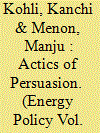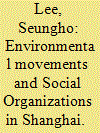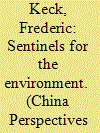|
|
|
Sort Order |
|
|
|
Items / Page
|
|
|
|
|
|
|
| Srl | Item |
| 1 |
ID:
149927


|
|
|
|
|
| Summary/Abstract |
Following the earthquake of 2001 in the Kutch district of Gujarat (India), the state government and corporate investors have focussed on the coastal areas of Kutch, India's largest district, for economic and infrastructure development. Within a decade of industrialisation of this landscape, these projects have had profound impacts on the environment, livelihoods and futures of its Kutchi inhabitants. Today, the coastline between the old Kandla and Mundra ports is drawn into a three-way battle between International Financial Institutions (IFIs) investing in coal projects, technical experts of sustainable development and international anti-coal campaigners. These three groups have selectively engaged the project affected Kutchis on the importance of economic development, environmental management and climate change. But the affected local people comprising artisanal fisherfolk who belong to a minority community, economically powerful salt and agricultural farmers and a traditional pastoral community of camel herders, frame, debate and act upon the impacts of the project in pragmatic ways. The range of remedies sought by them can be located between the practical expediency of everyday life and ethical questions about correct action. These remedies offer a glimpse of what regulatory bodies should be paying attention to rather than abstract or procedural justice.
|
|
|
|
|
|
|
|
|
|
|
|
|
|
|
|
| 2 |
ID:
079961


|
|
|
|
|
| Publication |
2007.
|
| Summary/Abstract |
This research aims to analyze environmental movements and social organizations in Shanghai since the late 1990s. The study reveals that civil society in Shanghai has increasingly had an impact on environmentally unfriendly policies given the priority of economic well-being in every aspect of society. The development of social organizations in environmental protection in Shanghai was identified through fieldwork carried out in 2002. Alongside existing social organizations already engaged in environmental protection, there was also an emergence of new social organizations. Most of the environmental NGOs in Shanghai-spearheaded by university students-lack capacity to exert much influence on environmental policies. In addition to student-based environmental NGOs, other types of social organizations include government-organized NGOs (GONGOs), local communities (shequ), the media, and international NGOs. The study evaluates how the local environmental NGOs in Shanghai evolved and survived in the transitional period interacting with other social organizations. It is concluded that a collaboration of GONGOs, NGOs, and various environmental groups together with international NGOs has led to the formation of a civil force that influences Shanghai's environmental policymaking
|
|
|
|
|
|
|
|
|
|
|
|
|
|
|
|
| 3 |
ID:
073737


|
|
|
| 4 |
ID:
106018


|
|
|
|
|
| Publication |
2011.
|
| Summary/Abstract |
There has been an ongoing debate about how (or through what mechanisms) global environmental norms have influenced domestic political debates that give rise to green policy choices. In particular, effective international environmental cooperation between transnational and domestic NGOs has been recognized as a key to successful environmental movements. In this regard, the central question guiding research on the politics of environmental norms is, under what condition(s) transnational cooperation among NGOs would be more likely to be sustained so as to achieve its goals. This article proposes that one of the mechanisms missing from the debate is a bottom-up approach through which transnational cooperation can be forged by the initiation of domestic NGOs. Drawing on social movement literature, it is hypothesized that domestic environmental NGOs with more resources, challenging ideologies, and more contentious modes of protest to dominant paradigms is more likely to nurture, develop, and sustain effective transnational cooperation for environmental norms. The validity of this hypothesis is demonstrated through the examination of wetland reclamation projects in Japan and Korea.
|
|
|
|
|
|
|
|
|
|
|
|
|
|
|
|
| 5 |
ID:
158738


|
|
|
|
|
| Summary/Abstract |
Theoretically, this article reveals the long-term risk for local non-governmental organisations (NGOs) of participating in transnational advocacy networks (TANs), accepting money from foreign sources and throwing ‘boomerangs’ internationally—a strategy used by local NGOs to seek international allies to pressure repressive and unresponsive states at home. Focusing primarily on the suppression of environmental NGOs that oppose natural-resource extraction, this article examines three cases—Russia, India and Australia—to illuminate the consequences of this trend for local civil society and TANs. It also documents a global trend towards states depicting local NGOs with international linkages as subversive agents of foreign interests, justifying legal crackdowns and the severing of foreign funding and ties. State framing of NGOs as agents of foreign interests is repressing local environmental activism, depoliticising civil society and weakening international NGO alliances—a conclusion with far-reaching consequences for the future of TANs, local NGOs and environmental activism.
|
|
|
|
|
|
|
|
|
|
|
|
|
|
|
|
| 6 |
ID:
139304


|
|
|
|
|
| Summary/Abstract |
This article compares the modes of organisation and engagement of birdwatching societies in Taiwan and Hong Kong. Tracing their origins to American, Japanese, and British models of nature conservation, it shows the growing involvement of Chinese citizens in the observation and protection of birds. Asking how birds can be used as “flagship species” to hold together environmental movements in a sustainable and constructive way, the article proposes the concept of “sentinel” to capture the mix of democratic environmental concern and a military model of territory mapping.
|
|
|
|
|
|
|
|
|
|
|
|
|
|
|
|
|
|
|
|
|